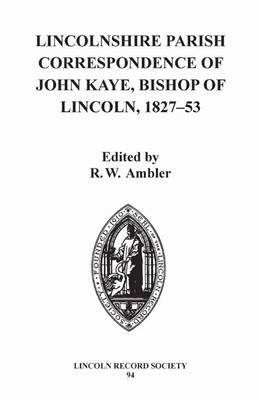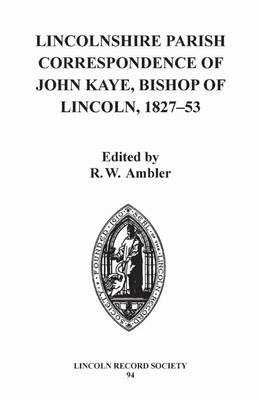
- Afhalen na 1 uur in een winkel met voorraad
- Gratis thuislevering in België vanaf € 30
- Ruim aanbod met 7 miljoen producten
- Afhalen na 1 uur in een winkel met voorraad
- Gratis thuislevering in België vanaf € 30
- Ruim aanbod met 7 miljoen producten
Zoeken
Lincolnshire Parish Correspondence of John Kaye, Bishop of Lincoln 1827-53
€ 41,95
+ 83 punten
Omschrijving
The 532 letters that are published in this volume come from the extensive correspondence that was received from people in Lincolnshire parishes by John Kaye, Bishop of Lincoln between 1827 and 1853. They are important because theyexpress the opinions and reflect the attitudes of lay people as well as clergymen: Kaye's correspondents ranged from members of the landed gentry to people who would usually have little direct contact with the bishop. They included a 'troublesome', 'deceptious' and 'pugnacious' village carrier disputing the fees charged for burial in his local churchyard, as well as the farmer who complained of the 'hill usige' that he had 'ricivid from the viker' of hisparish. The correspondence reflects Kaye's work as a Church reformer, but it is also important for the way that it demonstrates the changing significance of the Church in the lives of local communities. The extent to which the Church and its affairs were the means through which the social relations of parishes were articulated and sustained was a measure of the continuing importance of the establishment. ROD AMBLER is Senior Lecturerin History at the University of Hull.
Specificaties
Betrokkenen
- Uitgeverij:
Inhoud
- Aantal bladzijden:
- 560
- Taal:
- Engels
- Reeks:
- Reeksnummer:
- nr. 94
Eigenschappen
- Productcode (EAN):
- 9780901503794
- Verschijningsdatum:
- 16/11/2006
- Uitvoering:
- Hardcover
- Formaat:
- Genaaid
- Afmetingen:
- 160 mm x 236 mm
- Gewicht:
- 1020 g

Alleen bij Standaard Boekhandel
+ 83 punten op je klantenkaart van Standaard Boekhandel
Beoordelingen
We publiceren alleen reviews die voldoen aan de voorwaarden voor reviews. Bekijk onze voorwaarden voor reviews.










